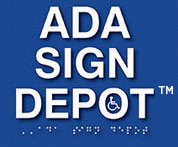Bill would reform abuse-prone disability rules
ADA Sign Depot
January 27, 2016

Bill would reform abuse-prone California disability rules
Jan. 25, 2016
By ORANGE COUNTY REGISTER EDITORIAL
The Golden State has another chance to rein in lawsuit abuse. Last week, the Assembly’s Judiciary Committee approved Senate Bill 269, a substantive reform meant to encourage small business owners to bring their businesses into compliance with disability accessibility law while protecting those proactive about doing so from frivolous lawsuits.
Introduced by Sen. Richard Roth, D-Riverside, the bill is virtually identical to last year’s SB251, which overwhelmingly passed the Legislature, only to be inexplicably vetoed by Gov. Jerry Brown, who objected to the inclusion of tax credits to help offset the cost of making properties more accessible.
California, unfortunately, has been a hotbed of lawsuit abuse, particularly with respect to the well-intended Americans with Disabilities Act of 1990. Meant to protect and enhance accessibility for people with disabilities, the law, as implemented in California, has been turned into a money-maker for serial plaintiffs.
Any violation of disability access laws, even minor, harmless, technical violations like the exact wording of parking signs, today is considered a violation of civil rights law. This makes it easy for plaintiffs who often prey on immigrant- and minority-owned businesses to make money on the most trivial of errors.
Meanwhile, accessibility has suffered from a lack of outreach by policymakers to help educate property owners about the importance of bringing properties into compliance with the ADA.
SB269 strikes a useful balance. It empowers small-business owners to correct technical violations within 15 days of being notified without threat of a lawsuit. It also gives small businesses a period of protection from liability if construction-related violations are identified and the business seeks a qualified inspection.
To accommodate the objections of some in the disability community and Mr. Brown, the latest iteration of the proposal reduces the definition of a small business from a business with up to 100 employees to a business with up to 50 employees and strikes the tax credits from the bill.
As we see it, the only people the proposal disadvantages are serial plaintiffs who use the cover of disability and civil rights law to line their pockets.


